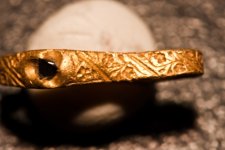You are using an out of date browser. It may not display this or other websites correctly.
You should upgrade or use an alternative browser.
You should upgrade or use an alternative browser.
First gold!!
- Thread starter lordspudz
- Start date
BillZ
Elite Member
Very cool and welcome to the forum!
I am guessing that by the age of the ring you are probably not in the U.S.
Where are you from?
I am guessing that by the age of the ring you are probably not in the U.S.
Where are you from?
NCBounty15
Forum Supporter
Nice ring, she looks pure! Welcome to the best forum on the Net! HH
NC
NC
Cherry Picker
Forum Supporter
Very nice indeed
RIP
Elite Member
Very nice, congrats.
randwool
Forum Supporter
Great job on the gold ring. Thanks for the photo.
Stevo
Forum Supporter
I would be pleased as well. Welcome from Wisconsin. Keep the finds coming.
RickO
"In Memory of"
Welcome aboard Lordspudz.... super find, did you get to keep it?? HH RickO
Lowjiber
Forum Supporter
Excellent find!!! It really looks old and custom made.
Welcome from California.
Welcome from California.
o4petesake
Junior Member
What are your rules over there?
Does that qualify as "treasure" and does the museum buy it off you?
Is it against the law not to turn it in to the Dept of Antiquities or something like that?
Does that qualify as "treasure" and does the museum buy it off you?
Is it against the law not to turn it in to the Dept of Antiquities or something like that?

What are your rules over there?
Does that qualify as "treasure" and does the museum buy it off you?
Is it against the law not to turn it in to the Dept of Antiquities or something like that?
England, only Allan?
2003 the act was amended to include prehistoric objects such as Bronze Age metalworking hoards and other non-precious metal items. This change is already altering our Knowledge of Bronze Age metal work.
What is Treasure?
See Treasure Finds for examples of objects found locally that have been classified as treasure.
Any metallic object, other than a coin, provided that at least 10 per cent by weight of metal is precious metal (that is, gold or silver) and that it is at least 300 years old when found.
If the object is of prehistoric date it will be Treasure provided any part of it is precious metal.
Any group of two or more metallic objects of any composition of prehistoric date that come from the same find (see below)
Two or more gold or silver (or 10 or more base metal) coins from the same find which are over 300 years old when found
Only the following groups of coins will normally be regarded as coming from the same find:
hoards that have been deliberately hidden
smaller groups of coins, such as the contents of purses, that may been dropped or lost
votive or ritual deposits.
Any object, whatever it is made of, that is found in the same place as, or had previously been together with, another object that is Treasure.
Any object that would previously have been treasure trove, but does not fall within the specific categories given above. Only objects that are less than 300 years old, that are made substantially of gold or silver, that have been deliberately hidden with the intention of recovery and whose owners or heirs are unknown will come into this category.
Note: An object or coin is part of the ‘same find’ as another object or coin if it is found in the same place as, or had previously been together with, the other object. Finds may have become scattered since they were originally deposited in the ground.
What do I do if I find Treasure?
If you think an item may be Treasure then you are required by law to report it within 14 days of first realising it might be Treasure. This can be done by contacting your local Finds Liaison Officer or the Coroner.
If the item qualifies as Treasure it will be offered to the local museum or the British Museum. If they want to purchase the item the coroner will hold an inquest and legally confirm that the object is Treasure. It will then be it will be valued by the Treasure Valuation Committee.
The finder and the landowner will each get 50% of the value as compensation for the find being claimed by the crown. If an object is not wanted by a Museum it is Disclaimed and returned to the finder and landowner, who are then free to keep or sell the object.
For more info on treasure finds please visit www.finds.org.uk Here you can view Treasure Annual Reports
o4petesake
Junior Member
Thanks for the info! 

Thanks for the info!
Your welcome.
The law is not quite that complicated as my post may imply. I just use common sense and if in doubt I ask our FLO. (Finds Liaison Officer)
I am sure the act just applies to England, Wales and Ireland.
Scotland’s law is different, and no I have no idea why!

Doug
simonthesearcher
Forum Supporter
Because there not from this planet Doug
Because there not from this planet Doug
Simon, there you are!
Incoming

Doug
simonthesearcher
Forum Supporter
You going to Glemsford next week Doug?
You going to Glemsford next week Doug?
Yes,will be across Friday(Sat & Sun). Note to our US hosts, Glemsford is a metal detecting rally, not a pop concert!

Doug
simonthesearcher
Forum Supporter
Will look out for you.We are arriving Friday morning
Similar threads
- Replies
- 1
- Views
- 322
- Replies
- 0
- Views
- 81
- Replies
- 2
- Views
- 132
- Replies
- 2
- Views
- 274




